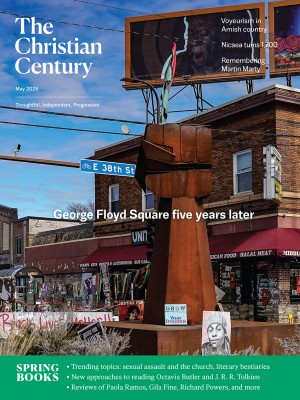May 25, Easter 6C (John 5:1-9)
Again and again, God comes near and changes everything.
For 38 years the man at the pool of Bethzatha has been weak and ill. Thirty-eight years—just shy of the 40 years the Israelites wandered the wilderness, barely outside the borders of God’s promised land. Within sight but not within reach. Time enough to wonder whether there is still reason to hope. Years enough to question whether the promise is sure. Years enough, too, to learn they are not alone—that God comes near, again and again.
Like the Israelites before him, the man at the pool of Bethzatha remains just outside the borders of promise, longing to attain the healing that stirs within its waters. The pool is within sight but not within reach. He cannot get there alone, and no one seems to notice.
Read our latest issue or browse back issues.
Then one day, long after the man has lost hope, Jesus comes near and asks him a question: “Do you want to be made well?”
I can imagine the man thinking to himself, with more than a little sarcasm, What?! Do you think I’m lying here by myself simply because I like the view? I’ve been ill and weak for a long time; of course I want to be well!
Instead he manages to share the sad, hard reality that his life has become. “I have no one,” he says. No one to notice the struggle to reach the water. No one to help him get to the pool. No one to care that he is ill and weak. No one to stand alongside as encourager and guide. No one, it seems, even to notice or see him.
No one, that is, until Jesus. Jesus sees the toll of those 38 long years. He sees the man. He sees the truth because he is the truth.
“Take up your mat and walk,” Jesus says. With those few words, the Word made flesh makes the man’s flesh whole. Jesus comes near, and the man is no longer forgotten or alone. And that changes everything.
Two thousand years later, I arrive at my mother’s home on the other side of the country. I’m standing beside the hospital bed in her living room, listening to the hiss and whir of the air mattress compressor, readying myself for another extended visit. It is my turn to give Mom’s youngest daughter a break from caregiving.
The first thing my mother says after I arrive is, “Why won’t anybody help me climb out of this bed?!” Her words fire a stinging accusation, as if it is our fault she cannot leap from that bed, fold the blankets, and head out the door. As she reminds us often, she wants nothing more than to hook a leash on her dog and take a walk around the block.
In truth a rare blood disease, together with a death squad that haunts aged bodies—pneumonia, sepsis, heart failure and muscle atrophy—conspire against her ability to take up her mattress and walk. Aside from occasional spins in a wheelchair, with transfers aided by a pneumatic lift and at least two able-bodied assistants, her world is limited to the walls of the room and the view out the window.
Each rising sun shines a light on her diminishing capacities. Short of a miracle she will continue to deteriorate until her 93-year-old body no longer supports her extraordinary will to live. Her children and a cadre of caregivers feed her every bite of her food, bathe her body, and treat her sores.
Age, illness, and the relentless pull of gravity have bound her to that bed for more than two years. But life is still beautiful, and restoration comes in many forms—each a gift from the same God who comes near to the man at Bethzatha through the healing power of Jesus.
Every Thursday afternoon a neighbor from church drops by the house with a backyard bouquet or grocery store orchid and sometimes a bakery treat decorated with pink frosting or purple flowers. An equally cheerful story from work fills the time of his short visit, which always ends with a kiss on the forehead and a prayer for her well-being.
A beloved longtime caregiver arrives early before work in order to take Mom’s dog for a much-needed walk. Meanwhile, friends from the local dog-training class, in which my mother and her beloved labrador retriever were once active participants, schedule a visit every month. They regale her with stories from class while their canine companions show off their tail-wagging skills.
The smiles and laughter—together with a few well-placed nuzzles from the dogs—bring light and life and connection to her days with the reminder that she is not forgotten nor alone. And even though she does not rise, take up her bed, and walk, those gifts of life and love and connection mirror the healing that Jesus brings to the man at the pool of Bethzatha.
And that changes everything.





